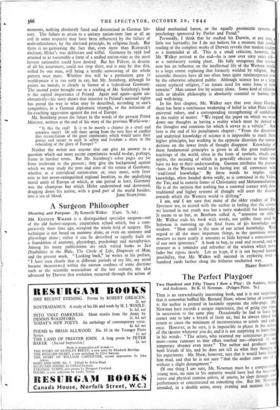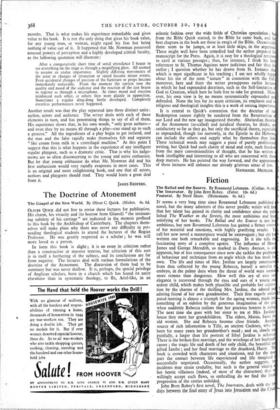The Perfect Playgoer
THIS is an extraordinarily interesting book, and it is not surprising that it somewhat baffled Mr. Bernaid Shaw, whose letter of comment to the author is printed in facsimile opposite the title-page. Mr. Newman here records a unique experience, that of going 25o times in succession to the same play. Occasionally he had to leave his corner seat to take a breath of fresh air, but he always timed his return to cause the minimum of inconvenience to actors and audi- ence. However, as he says, it is impossible to please ih the milieu of the theatre whatever you do, and it is not surprising to learn that, in his words : "-The actors, Who resented my continuous presence most—some rumours to that effect reached me—objected t6 my temporary absence even more." The author and producer were both friends of his, and he does not tell us what they thought of his experiment. Mr. Shaw, however, says that it would have driven him mad, and that he is not sure " that the author came out of it without a slight derangement." Of one thing I am sure, Mr. Newman must be a comparative! young man, no man in his maturity would have had the necessary nerve and physical stamina unless, of course, he slept through each performance or concentrated on something else. But Mr. Newnan attended, in a double sense, every evening and matinee for fist
months. That is what makes his experience remarkable and gives value to his book. It is not the only thing that gives his book value, for any young man, or woman, might equal his feat but bring nothing of value out of it. It happened that Mr. Newman possessed unusual powers of perception and a highly developed critical faculty, as the following quotation will illustrate: After a comparatively short time of serial attendance I began to see everything on the stage as through a magnifying glass. All seemed to assume an undue importance. Slightly differing movements of the actor or changes of intonation or speed became minor events. Even accidental changes of position of the furniture or props became immediately noticeable. From the moment the curtain rose the quality and mood of the audience and the reaction of the cast began to register as through a microphone. At times mood and reaction reinforced each other, at others they were plainly in opposition. Sometimes a regular ding-dong battle developed. Completely eventless performances never happened.
Another result was that the play separated into three distinct units: author, actors and audience. The writer deals with each of these elements in turn, and has penetrating things to say of all of them. His experience shows that, in his own words, " only great authors— and even they by no means all through a play—can stand up to such a process." All the ingredients of a play begin to get isolated, and the true and the false rapidly make themselves felt and separate " like cream from milk in a centrifugal machine." At this point I suggest that this is what happens in the experience of any intelligent regular playgoer, such as a dramatic critic. That is why his judge- ments are so often disconcerting to the young and naive enthusiast. But let that young enthusiast do what Mr. Newman did and his first enthusiasm would very rapidly evaporate in most cases. This is an original and most enlightening book, and one that all actors, authors and playgoers should read. They would learn a great deal from it.
JAMES REDFERN.



























 Previous page
Previous page